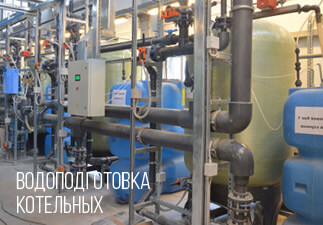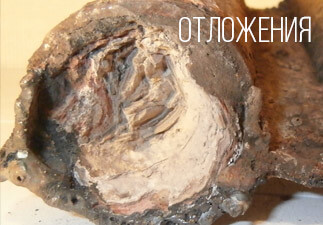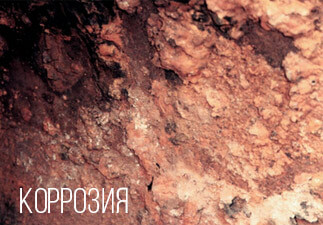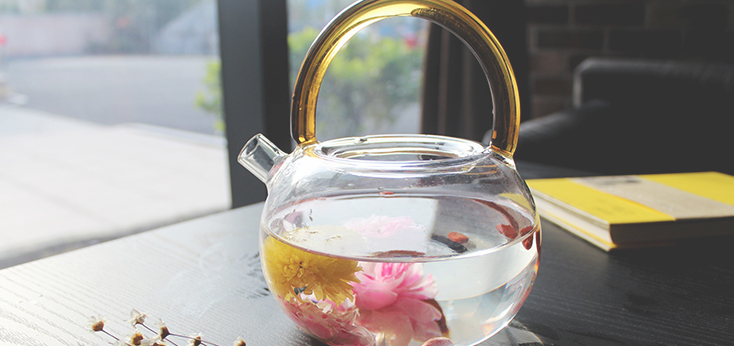Often, boiler users do not realize that they can significantly reduce costs by making the boiler run more economically. The reason for uneconomical operation of the boiler in many cases is insufficient treatment of feed water.
In addition, manufacturer recommendations and technical requirements imply quality water treatment for boilers. Lack of purification equipment or its low quality leads to a high risk of failure of boilers.
BENEFITS OF USING TREATED WATER

Using treated water has the following advantages:
- No deposits accumulate on the heat conducting surfaces;
- The system is protected against corrosion;
- The boiler operates smoothly, the quality of steam corresponds to its purpose, losses due to deposits are minimized.
The above factors ensure high economy of boiler equipment due to lower energy consumption, minimization of repair costs, reduced wear and tear of materials.
Although the mismatch of boiler water treatment or its complete absence is not the only cause of failure of boiler equipment, the purchase of a water treatment plant is much more profitable than the elimination of damage caused in case of an accident. And the risk of an accident when using untreated water is quite high.
DANGER OF DEPOSITS IN THE BOILER
The accumulation of deposits in the boiler and in the heating system leads to adverse effects:
- deterioration of heat output and heat transfer;
- Creation of cracks as a result of overheating in certain areas;
- formation of noise;
- increase of flow resistance due to reduction of working section of pipes.
To prevent the accumulation of deposits, a quality boiler water treatment is necessary, which will ensure:
- water softening by ion exchange;
- demineralization by reverse osmosis;
- removal of mechanical impurities by mesh filters with backwashing;
- removal of iron and manganese by filters with catalytic loading.

HOW TO FIGHT CORROSION

Since the elements of the heating system are made of metal, they are subject to corrosion. The corrosion resistance of metal depends on the protective layer of oxides on its surface. Chemical and physical factors, such as the pH range and the presence of excessive oxygen in the system, can contribute to the breakdown of the protective layer.
To minimize corrosion, the following water treatment recommendations should be followed:
- Use of corrosion inhibitors;
- The use of oxygen binders;
- Correcting the pH level with reagents

Untreated tap water contains mechanical impurities, metals, bacteria, pesticides, chemicals in varying amounts that accumulate in the body and can cause various diseases.

Water treatment helps get rid of the unpleasant taste and odor that appear as a result of an increase in the concentration of inorganic and organic substances in the composition of such water.

Lithuanian water leads to the accumulation of scale on the heating surfaces of electrical appliances, consequently reducing their thermal conductivity. This accelerates appliance failure and increases energy costs.

It is known that the consumption of clean water is extremely important for maintaining health. That is why purified water is necessary for a person to protect himself from many diseases and to continue an active life without doctors and pills.
WATER TREATMENT FOR STEAM BOILERS
The operation of steam boilers is largely influenced by the chemical composition of water. Water treatment for steam boilers requires the involvement of specialists with the necessary knowledge and skills.
The water quality requirements for boiler systems are set at a level at which the boiler operates safely and efficiently, while the likelihood of accumulation of deposits and corrosion is minimized.
However, it is better to focus not on the requirements of supervisory authorities, but on the manufacturer's recommendations, more stringent and aimed at the most efficient and long-lasting operation.
When designing chemical water treatment for steam boilers, it is important to consider the carbonate hardness of the source water and the proportion of condensate in the feed water. To ensure that the water meets the requirements, the bound carbon dioxide and hardness must be monitored.
If the carbonate hardness is high, it is only possible to achieve the required maximum value of bound carbon dioxide by means of ion exchange softening if the condensate return rate is high. Low condensate return will require the installation of a reverse osmosis system.
Chemical water treatment for steam boilers usually includes a reverse osmosis unit, a water softener, monitoring devices and reagents. For the selection of equipment, it is better to contact the experts.
WATER TREATMENT FOR HOT WATER BOILERS
In order to ensure long-term operation of the hot water boiler and automatic make-up system, you need to think about water treatment equipment at the design stage.
To calculate the water treatment system for boilers the following factors must be taken into account:
- water hardness;
- the content of petroleum products, iron, dissolved oxygen;
- pH level;
- the maximum hourly flow rate of water;
- boiler capacity and its thermal regime.
The requirements for water supplied to the boiler may vary depending on the boiler capacity, heating system and purpose of the water.
Gas boiler water treatment consists of mechanical treatment, deferrization if necessary, softening, dosing of reagents to achieve the required level of pH and oxygen, measuring instruments.
In the company "Aquarum" you can buy filters for water treatment of gas boilers, as well as equipment for water treatment of heating boilers. You can buy equipment in Kiev and Odessa or order delivery in Ukraine. With our specialists you can also get advice on any matter relating to water treatment of boiler installations.
own enterprise
customized solutions
operational experience
and installation







